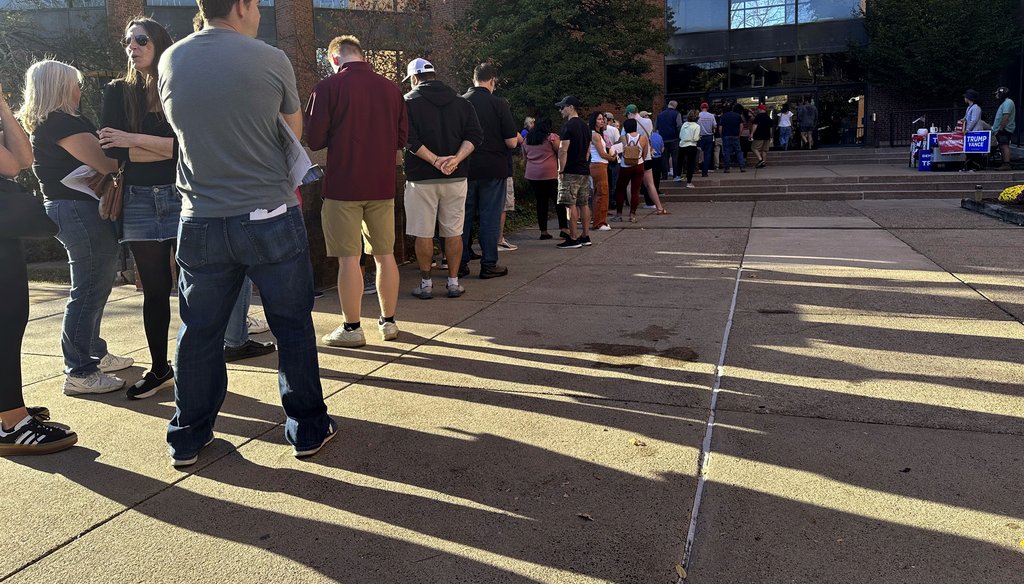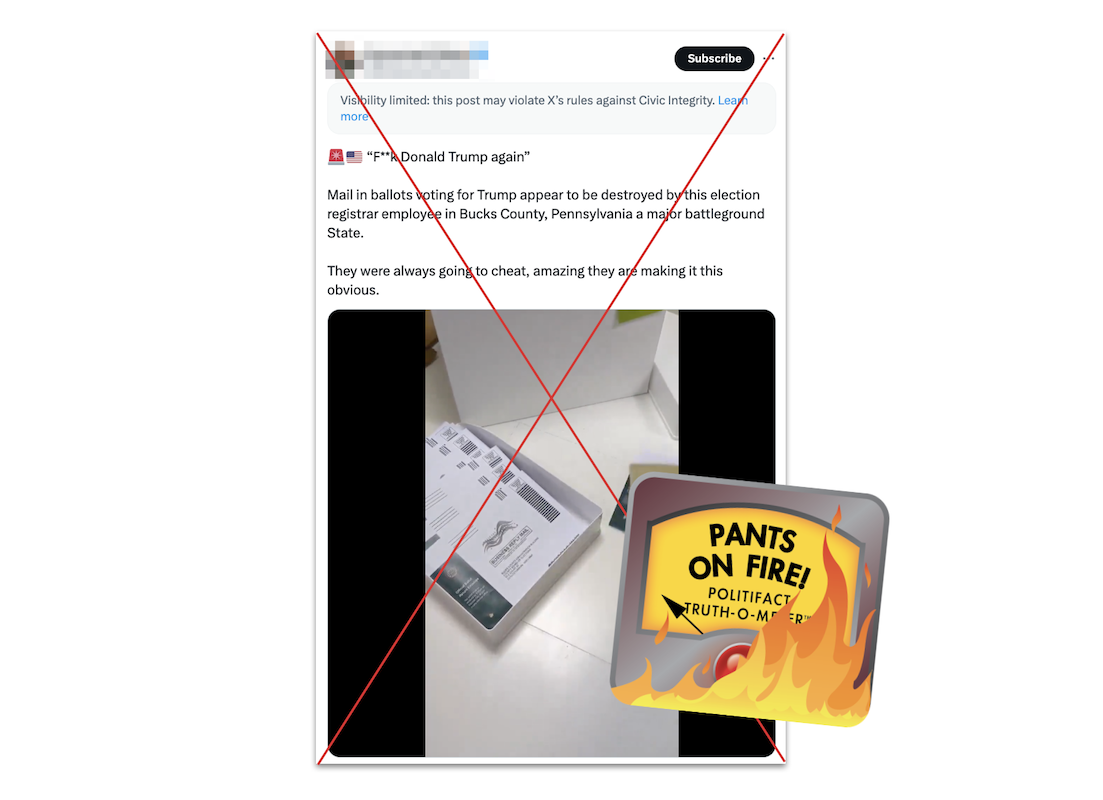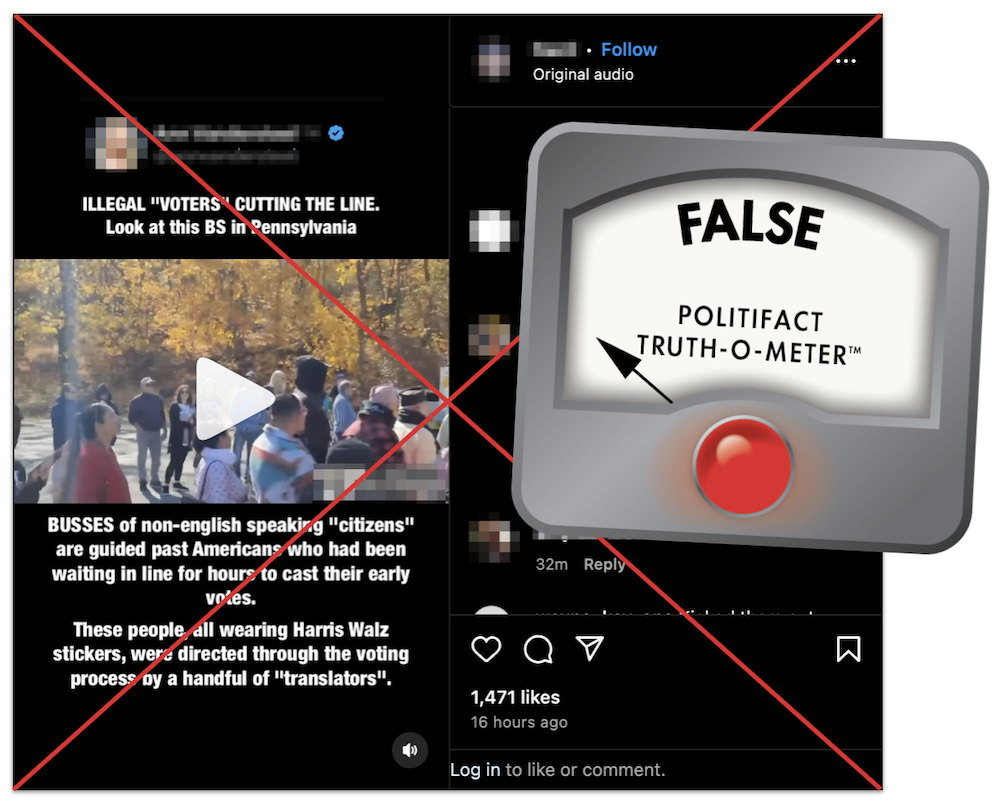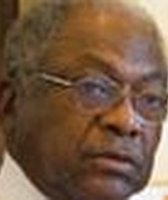Stand up for the facts!
Our only agenda is to publish the truth so you can be an informed participant in democracy.
We need your help.
I would like to contribute

Voters line up outside the Bucks County Administration Building during early voting in the general election Nov. 1, 2024, in Doylestown, Pennsylvania. (AP)
In the week before Election Day, former President Donald Trump repeatedly told his supporters that voter fraud and cheating is happening in Pennsylvania.
"Pennsylvania is cheating, and getting caught, at large scale levels rarely seen before," Trump posted Oct. 30 on Truth Social. "REPORT CHEATING TO AUTHORITIES. Law Enforcement must act, NOW!"
Law enforcement officials announced days earlier that they were investigating suspect voter fraud registrations in Lancaster County — a probe Trump dramatized as fraudulent ballots cast in the election.
Trump, who has spent years spreading falsehoods about voting, may have the loudest megaphone on social media. But he’s not the only person spreading baseless claims of cheating in the Keystone State.
Pennsylvania has 19 electoral votes, the most of any battleground state, and is under intense scrutiny in the close presidential race between Trump and Vice President Kamala Harris.
Its election processes have been a source of several false claims spread by Trump or on social media starting about two weeks before Election Day. The falsehoods target people trying to vote, local election officials and vote counting processes, raising doubts among voters.
Pennsylvania election officials say voting is secure, and say some voter registration forms being under investigation signals that the system to prevent fraud is working.
Secretary of the Commonwealth Al Schmidt said Oct. 31 that local, nonpartisan election officials are taking several steps to ensure a secure election, such as verifying the eligibility of people who apply to register to vote and that every returned mail ballot is from a registered voter. Gov. Josh Shapiro, a Democrat, nominated Schmidt, a Republican, to the top elections position in 2023.
Voting rights advocates celebrated turnout so far, more than 1.7 million as of midday Nov. 2, but lamented the spreading of falsehoods. As the 2020 election showed, a confluence of factors creates a fertile ground for election misinformation in the state. For one, state law bans officials from processing mail ballots until Election Day, which can lead to slower results than some states that start counting weeks earlier.
"The tight nature of the race in the state with the largest electoral prize in play, along with a very diverse array of electoral administration procedures and rules that limit pre-canvassing of mail ballots make the commonwealth ripe for efforts to spread inaccurate information," said Christopher P. Borick, a political science professor and director of the Muhlenberg College Institute of Public Opinion in Pennsylvania. Pennsylvania "has all the ingredients in place to make it the epicenter of misinformation in this electoral cycle."
Nationwide as of Nov. 2, there are about 200 pending election-related lawsuits, including 20 in Pennsylvania. A judge sided with a Trump campaign lawsuit seeking to extend the deadline for mail-in voting in Bucks County, where there had been long lines on the last day to return ballots.
Since the commonwealth could decide who wins the presidency, "some bad actors are trying to sow doubt to contest the election if it doesn't go their way," Philip Hensley-Robin, Common Cause in Pennsylvania executive director, said.
Here’s a look at our fact-checks of falsehoods and exaggerations in Pennsylvania.
Election workers are not ripping up ballots, swaying results
Local election officials from both parties have tried to debunk a video post that said an election worker was ripping up ballots cast for Trump in Bucks County. We rated that video Pants on Fire.
Federal officials said Russian actors manufactured and amplified the video.
(Screenshot from X)
Voter registration applications — not ballots — under investigation
On his Truth Social platform Oct. 31, Trump wrote that his campaign "caught them CHEATING BIG in Pennsylvania." Trump didn’t explain what he was referring to, but days earlier Lancaster County officials said they were investigating 2,600 suspect voter registration applications.
An initial statement by the county said it was investigating "ballots," but a county spokesperson said that was a mistake, and subsequent statements said the elections office was investigating voter registration applications.
An application to register to vote is a request from a person to be added to the voter rolls; it is not the same document as a ballot on which a voter selects candidates.
Trump twisted the investigation and falsely said at an Allentown rally, "We caught them with 2,600 votes. ... And every vote was written by the same person."
Lancaster County Commissioner Ray D’Agostino, a Republican, said Oct. 31 on CNN that "several hundred" applications have been determined to be fraudulent and that the investigation continued.
"Election workers are doing their job," D’Agostino said. "This was detected, it was stopped."
Republican officials can be effective in countering falsehoods from fellow Republicans, but other Republican leaders are still sharing some disinformation, said Shannon C. McGregor, principal investigator at the Center for Information, Technology, and Public Life at the University of North Carolina, Chapel Hill.
Pennsylvania Attorney General Michelle Henry, a Democrat, said in an Oct. 31 statement, "Apparent attempts to submit fraudulent voter registration forms in Berks, Lancaster, Monroe, and York counties have been defeated."
The facts about what is or isn’t happening in lines
Social media users falsely claimed buses of noncitizens are being sent to polling locations to sway the election for Harris. Elon Musk, a frequent spreader of election and immigration falsehoods this year, amplified the falsehood. Only U.S. citizens can vote in federal elections.
In Allegheny County, a viral video captured a brief conversation between a group of voters, their translators and a local election official at a polling location. The voters in the video were at a polling center to apply for mail-in ballots. The older and disabled voters were allowed to sit, rather than stand in line, as their applications were processed, which is standard procedure, the county said.
(Screenshot from Instagram)
In Delaware County, social media posts misled about a Republican woman at a voter service center. Some posts amplified by Republican National Committee Chair Michael Whatley and Trump left viewers with the impression that the woman was handcuffed and asked to leave the center because she was telling voters to stay in line.
The county said some people complained that the woman, who was at the center’s lobby for two hours, was repeatedly approaching voters. The county said she was "briefly detained and issued a citation for disorderly conduct."
State law allows voters to go to election offices and apply for and receive a mail ballot and cast it right there. This created long lines in Bucks County. The Associated Press found that some voters chose the in-person method because of Trump’s messages about voting.
"Because he told us to vote early. I was just trying to make it ‘too big to rig,’" said Marlene Burns, repeating one of Trump’s talking points encouraging his supporters to vote.
The Trump campaign sued and a judge ruled to extend the deadline until the close of business Nov. 1. Sara Rose, the deputy legal director of the ACLU of Pennsylvania, said the lawsuit was "valid." She talked to a voter who said police officers wouldn’t let him get into the line at 3 p.m. on Oct. 29 even though that was two hours before the deadline.
There are not 180,000 Amish on the voter rolls
Social media users spread the falsehood that there were "180,000 registered New Amish voters in Lancaster, Pennsylvania."
That was mathematically impossible. Lancaster County has 366,000 registered voters as of Oct. 28, state records show. About 38,000 Amish people live in the county, according to the latest population count taken in early summer 2024 and shared with PolitiFact by Steven Nolt, a professor and director of the Young Center for Anabaptist and Pietist Studies at Elizabethtown College.
Of the 38,000 Amish residents, more than half are younger than 18, thus ineligible to vote.
Waiting days for election results is not a sign of nefarious activity
A Threads post falsely said that the fact that election officials in Pennsylvania, Georgia and Michigan said they won’t know results on election night is a sign of "cheating." It’s not. In 2020, the outcome of Pennsylvania was not clear until Saturday because it took time to count mail ballots.
All states have laws that set deadlines to count ballots. Media outlets project winners based on their own methodologies and if the margin is wide, that can occur on election night. But in Pennsylvania, the margin could be close.
Seizing on media mistakes
WNEP-TV, an ABC News affiliate in Moosic, Pennsylvania, accidentally aired test 2024 presidential election results in October that showed Harris winning over Trump. But the results weren’t real, nor were they evidence of election interference.
WNEP published an Oct. 27 statement on its website explaining that election test results were mistakenly shown on air.
This also happened with other TV stations during the 2020 election.
This story may be updated with additional fact-checks. PolitiFact Staff Writers Sara Swann, Kwasi Gyamfi Asiedu and Loreben Tuquero and Contributing Writer Ciara O'Rourke contributed to this article.
Our Sources
Pennsylvania Department of State, On-demand mail ballot voting and PA Cast, Accessed Oct. 31, 2024
Former President Donald Trump, Truth Social post, Oct. 31, 2024
Former President Donald Trump, Truth Social post, Oct. 30, 2024
University of Florida Election Lab, 2024 early voting, Accessed Oct. 31, 2024
Marc Elias, X post, Oct. 31, 2024
Marc Elias, X post, Nov. 2, 2024
CNN, Interview with Lancaster County Commissioner Ray D’Agostino, Oct. 31, 2024
Pennsylvania Attorney General Michelle Henry, Statement, Oct. 31, 2024
Pennsylvania Department of State, On-Demand Mail Ballot Voting, Accessed Nov. 2, 2024
ODNI, FBI, and CISA, Statement, Oct. 25, 2024
Associated Press, A clumsy early voting option has backed up election offices in Pennsylvania and frustrated voters, Oct. 29, 2024
Court of Common Pleas of Bucks County, Ruling, Oct. 30, 2024
Email interview, Adam Bonin, election lawyer in Pennsylvania, Oct. 31, 2024
Email interview, Ellen Lyon, Pennsylvania Department of State spokesperson, Oct. 31, 2024
Telephone interview, Sara Rose, deputy legal director of ACLU of Pennsylvania, Oct. 31, 2024
Email interview, Christopher P. Borick, a political science professor and director of the Muhlenberg College Institute of Public Opinion in Pennsylvania, Oct. 31, 2024
Email interview, Shannon C. McGregor, principal investigator at the Center for Information, Technology, and Public Life, at the University of North Carolina, Chapel Hill, Oct. 31, 2024
Email interview, Philip Hensley-Robin, Common Cause in Pennsylvania Executive Director, oct. 31, 2024
See links in fact-checks for additional sources












































